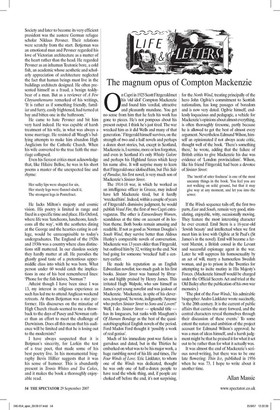The magnum opus of Compton Mackenzie
n Capri in 1925 Scott Fitzgerald met his 'old idol' Compton Mackenzie and found him 'cordial, attractive and pleasantly mundane. You get no sense from him that he feels his work has gone to pieces. He's not pompous about his present output. I think he's just tired. The war wrecked him as it did Wells and many of that generation.' Fitzgerald himself survives, on the strength of two and a half novels and perhaps a dozen short stories, but, except in Scotland, Mackenzie is, I surmise, more or less forgotten, and even in Scotland it's only Whisky Galore and perhaps his Highland farces which keep his name alive. It will surprise many to learn that Fitzgerald once idolised him, but This Side of Paradise, his first novel, is very much son of Mackenzie's Sinister Street.
The 1914-18 war, in which he worked as an intelligence officer in Greece, may indeed have left Mackenzie tired, but it hardly 'wrecked him'. Indeed, within a couple of years of Fitzgerald's dismissive judgment, he would publish Vestal Fire, the first of two Capri extravaganzas. The other is Extraordinary Women, scandalous at the time on account of its lesbian theme. Both books remain amusing and readable. If not as good as Norman Douglas's South Wind, they survive better than Aldous Huxley's comparable novels of conversation. Mackenzie was 13 years older than Fitzgerald, but outlived him by 32, writing to the end. Not bad going for someone 'wrecked' half a century earlier.
He made his reputation as an English Edwardian novelist; too much gush in his first books. Sinister Street was banned by libraries and highly praised by Henry James. This irritated Hugh Walpole, who saw himself as James's pet young novelist and was jealous of Mackenzie. 'Mackenzie, in spite of his cleverness, is no good,' he wrote, indignantly. 'Anyone who prefers Sinister Street to Sons and Lovers!' Well, I do. Sinister Street — splendid title — has its longueurs, but ranks with Maugham's Of Human Bondage as the best of the quasiautobiographical English novels of the period. Ford Madox Ford thought it 'possibly a work of real genius'.
Much of his immediate post-war fiction is garrulous and dated, but in the Thirties he embarked on what was to be his major work, a huge rambling novel of his life and times, The Four Winds of Love. Eric Linklater, to whom one of the Winds was dedicated, thought he was only one of half-a-dozen people to have read the whole thing, and, if people are choked off before the end, it's not surprising, for the North Wind, treating principally of the hero John Ogilvie's commitment to Scottish nationalism, has long passages of boredom and is now very dated. Ogilvie himself endlessly loquacious and pedagogic, a vehicle for Mackenzie's opinions about almost everything, is often thoroughly tiresome, partly because he is allowed to get the best of almost every argument. Nevertheless Edmund Wilson, himself an opinionated if not always acute critic, thought well of the book. 'There's something there,' he wrote, adding that the failure of British critics to give Mackenzie his due was evidence of 'London provincialism'. Wilson, like his friend Fitzgerald, had been a devotee of Sinister Street: The 'motif of utter foulness' is one of the most uncanny things in the book. You feel you are not walking on solid ground, but that it may give way at any moment, and let you into the sewer.
If the Winds sequence tails off, the first two parts, East and South, remain very good, stimulating, enjoyable, witty, occasionally moving. They feature the most interesting character he ever created. Emil Stern is a 16-year-old 'Jewish beauty' and intellectual when we first meet him in love with Ogilvie at St Paul's (St James's in the novel) Emil will become a fervent Marxist, a British consul in the Levant and successful espionage agent in the war. Later he will suppress his homosexuality by an act of will, marry a humourless Swedish woman, and go to prison in the Twenties for attempting to incite mutiny in His Majesty's Forces. (Mackenzie himself would be charged under the Official Secrets Act and tried at the Old Bailey after the publication of his own war memoirs.) 'The plot of the Four Winds,' his admirable biographer Andro Linklater wrote succinctly, 'is the 20th century. It is the current of public affairs that carries the story forward, and the central characters reveal themselves through their discussion of these events.' To some extent the nature and ambition of the project account for Edmund Wilson's approval; he was a man of ideas himself, and a harsh judgment might be that he praised it for what it set out to be rather than for what it actually was.
It was almost the end of Mackenzie's serious novel-writing, but there was to be one late flowering: Thin Ice, published in 1956 when he was 73. I hope to write about it another time.
Allan Massie























































 Previous page
Previous page